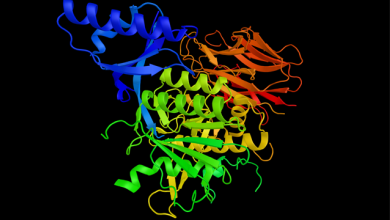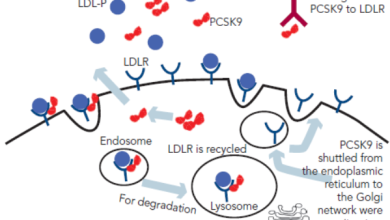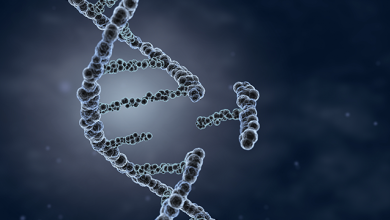Search results
Author(s):
Evan A Stein
Added:
3 years ago
Proprotein convertase subtilisin/kexin type 9 (PCSK9), discovered in 2003, is a circulating protein produced predominantly in the liver that plays a significant role in the recycling of LDL receptors (LDLRs).1,2 The LDLR, which normally recycles about 100 times in its lifetime, is the primary pathway for LDL-cholesterol (LDL-C) clearance from circulation. Plasma PCSK9 binds to LDLRs along with…
View more
Author(s):
Rishi Rikhi
,
Michael D Shapiro
Added:
9 months ago
Author(s):
Reynaria N Pitts
,
Robert Eckel
Added:
3 years ago
Elevated levels of low-density lipoprotein cholesterol (LDL-C) have long been established as one of the most important risk factors for developing coronary artery disease (CAD) and other forms of atherosclerotic cardiovascular disease (CVD).1,2 Targeting LDL-C reduction has been effective in lowering cardiovascular risk.3,4 The use of HMGCoA reductase inhibitors (statins) for both primary and…
View more
Author(s):
Jiaqian Xu
,
Michael D Shapiro
Added:
3 years ago
Author(s):
Shane Prejean
,
Todd M Brown
Added:
3 years ago
Proprotein convertases are proteolytic enzymes that activate proteins by post-translational alterations in protein structure. Proprotein convertase subtilisin/kexin 9 (PCSK9) is a proprotein convertase that binds and inactivates the low-density lipoprotein (LDL) receptor on the surface of hepatocytes resulting in higher levels of serum LDL cholesterol (LDL-C).1 Over-expression of PCSK9 leads to a…
View more
Added:
3 years ago
By David Ramsey, EPA 2015
Background statin therapy, even the use of high-dose statin therapy, did not affect the ability of alirocumab (Sanofi/Regeneron) to reduce LDL-cholesterol levels in patients at high cardiovascular risk, delegates heard at the European Atherosclerosis Society 2015 Congress, Glasgow.
According to a new analysis of 4000 patients, investigational inhibitor of proprotein…
View more
Added:
3 years ago
Source:
Amgen News Room
Study Meets Co-Primary Endpoints of LDL Cholesterol Reduction
Amgen today announced that the Phase 3 GAUSS-2 (Goal Achievement After Utilizing an Anti-PCSK9 Antibody in Statin Intolerant Subjects-2) trial evaluating evolocumab in patients with high cholesterol who cannot tolerate statins met its co-primary endpoints: the percent reduction from baseline in low-density lipoprotein cholesterol …
View more
Author(s):
Antonio J Vallejo-Vaz
Added:
3 years ago
Elevated LDL cholesterol (LDL-C) plays a major role in the development of atherosclerotic cardiovascular disease (ASCVD). Multiple studies and meta-analyses, including randomised controlled trials, prospective cohort studies and Mendelian randomisation studies, have consistently shown an association between LDL-C and ASCVD risk that is proportional to the magnitude and duration of exposure to…
View more
Added:
3 years ago
Barcelona, Spain – 28 Aug 2017:Very aggressive reduction of LDL-cholesterol to ultra-low levels was associated with progressively fewer cardiovascular events and appears to pose no safety concerns in patients with stable atherosclerotic cardiovascular disease over 2.2 years of follow-up, according to a new analysis of the FOURIER trial.
The findings, presented at ESC Congress today and published…
View more
Added:
3 years ago
Rome, Italy – 27 Aug 2016: European Society of Cardiology (ESC) and European Atherosclerosis Society (EAS) Guidelines for the management of dyslipidaemias are published online today in European Heart Journal1 and on the ESC Website.2
Cardiovascular disease (CVD) kills over four million people in Europe each year. At least 80% of CVD could be prevented by eliminating health risk behaviours.
…
View more











